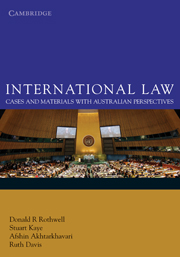Book contents
- Frontmatter
- Contents
- Preface
- About the authors
- Acknowledgements
- Table of cases
- Table of statutes
- Table of treaties and other international instruments
- Abbreviations
- 1 The nature of international law
- 2 Sources of international law
- 3 Law of treaties
- 4 International and municipal law
- 5 International legal personality
- 6 Sovereignty over territory
- 7 Jurisdiction
- 8 State responsibility
- 9 Human rights
- 10 Law of the sea
- 11 International environmental law
- 12 Enforcement of international law
- 13 The peaceful settlement of international disputes
- Index
- References
1 - The nature of international law
- Frontmatter
- Contents
- Preface
- About the authors
- Acknowledgements
- Table of cases
- Table of statutes
- Table of treaties and other international instruments
- Abbreviations
- 1 The nature of international law
- 2 Sources of international law
- 3 Law of treaties
- 4 International and municipal law
- 5 International legal personality
- 6 Sovereignty over territory
- 7 Jurisdiction
- 8 State responsibility
- 9 Human rights
- 10 Law of the sea
- 11 International environmental law
- 12 Enforcement of international law
- 13 The peaceful settlement of international disputes
- Index
- References
Summary
Introduction
What would the world be like without international law? We cannot really answer this question but we do know that the world relies on this body of law to deal with important and difficult issues that require cooperation among the States or nations of the world. Such problems include terrorism, the increasing spread of HIV/AIDS, countries expanding their nuclear arsenals, reducing the flow of refugees and asylum seekers into neighbouring countries, and mitigating the potential of climate change. International law is commonly defined as the rules governing the legal relationship between States. International law provides a framework for understanding what rights and duties States have in relation to each other, and other international actors such as the United Nations (UN). This definition emphasises the role of States in establishing the legal relationships needed for solving many of their cooperation problems internationally. It creates a predominant role for States in establishing a normative way of dealing with issues of global significance. The ‘law’ in international law is traditionally a reference to rules or principles. These rules are seen as obligatory by virtue of the fact that States consent to being bound by them. It is normal to look for these rules in agreements which States sign with each other (ie treaties) or by examining the customary practices of States in relation to particular issues (ie customary international law).
The increasing impact and role of international law is also part of the phenomena of globalisation.
- Type
- Chapter
- Information
- International LawCases and Materials with Australian Perspectives, pp. 1 - 41Publisher: Cambridge University PressPrint publication year: 2010

